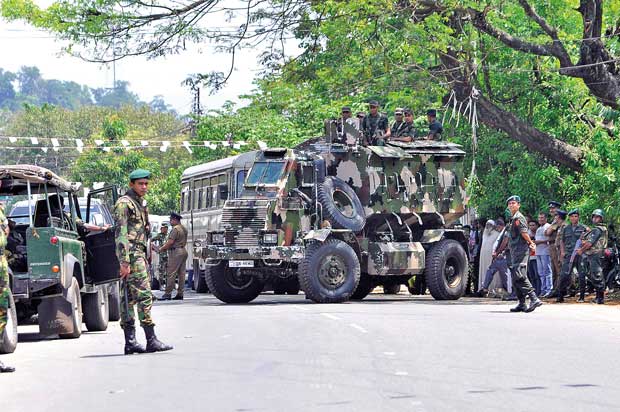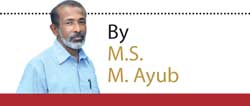No Political will, No Answer to Unrests
Objective of politicians is not finding solutions, but gaining mileage out of anything
- Until leaders develop political will the country would have to undergo state of emergency and curfews
- JO argues that UNP orchestrated the riots to prevent the No-Confidence Motion and the anti-Wickremesinghe rebellion in UNP
- Muslims seem to be more inclined to believe the UNP theory
- Earlier Muslims complained that SLPP supporters harassed Muslims in Kandy and Kalutara Districts for not supporting them.

The very blame-game among the politicians, especially between the United National Party (UNP) and the Sri Lanka Podujana Peramuna (SLPP) on the recent attacks against Muslims is an indication that Sri Lankan politicians are not serious about any kind of ethnic strife, leave alone finding solutions to them.
Their objective is not finding solutions, but to gain political mileage out of anything.
Almost all political parties, especially the two main political parties in the country, the UNP and the SLPP claim that the attacks against ‘few’ Muslim owned shops and mosques in Ampara and hundreds of houses, businesses and mosques in various areas in the Kandy District were orchestrated.
But by whom?

All political parties seem to attempt to use the recent rampage to prove their political credentials or the detriment of the politics of their adversaries.
The UNP argues that the SLPP or the loyalists of the former President Mahinda Rajapaksa were behind the attacks, while the SLPP attempts to contend that the Government premeditated the anti- Muslim pogrom.
Interestingly, both groups have their own reasons to put the blame for the crimes on the other.
Muslims had continued to support the UNP at last month’s Local Government elections, despite more than 1.5 million voters, who supported the party at the last Parliamentary Elections, rejecting it this time.
The SLPP that won the majority of councils had managed to get only 45 percent (or 40 percent according to Minister Champika Ranawaka) of total valid votes and this showed that they could not win the next Presidential Election.
Therefore they as a strategy to pit the Muslims against the UNP had calculated the anti-Muslim attacks, according to the UNP theory.
Expanding the same theory, the senior Tamil columnist D.B.S. Jeyaraj claims that conspirators had set in motion a plan, where the Government would hesitate to take action against the attackers for fear of losing the Sinhalese votes and it would also lose the Muslim votes as well due to its inaction against the rioters.
Whether the attacks were premeditated or not, whether this was really the strategy, this was what really happened.
The belief among the Muslims that no untoward incidents would happen against them under a UNP regime was shattered by the incredible inaction of the law enforcement authorities during the Kandy attacks which lasted for not hours, but days
On the other hand, the unrest started at a time when a No-Confidence Motion against Prime Minister Ranil Wickremesinghe was to be handed over to the Speaker of Parliament, Karu Jayasuriya and several UNP local leaders had started to challenge the leadership of Mr Wickremesinghe in the party.
The Joint Opposition, the Parliamentary group loyal to former President Mahinda Rajapaksa, argues that UNP orchestrated the riots to prevent the No-Confidence Motion and the anti-Wickremesinghe rebellion within the UNP.
The Joint Opposition, the Parliamentary group loyal to former President Mahinda Rajapaksa, argues that UNP orchestrated the riots to prevent the No-Confidence Motion and the anti-Wickremesinghe rebellion within the UNP.
However, the victims of the week- long mob attack, the Muslims seem to be more inclined to believe the UNP theory, in spite of the fact they have lost confidence in the UNP as well due to its inordinate lethargy in quelling the attacks on them.
The Muslim Council of Sri Lanka (MCSL), on the wake of the SLPP sweeping the majority of Local Councils at the February 10 elections wrote to that party complaining about SLPP supporters having harassed Muslims in two places in Kandy and Kalutara Districts for not supporting them.
While Mr Basil Rajapaksa had promised the MCSL to look into the matter, party Chairman Professor G.L. Peiris and General Secretary Sagara Kariyawasam had flatly denied the allegation. Despite the MCSL having not gone public with the allegations the SLPP did so with its denials.
Against this backdrop it is natural that the Muslims suspect SLPP’s hand in the Ampara and Kandy mayhem.
However, the belief among the Muslims that no untoward incidents would happen against them under a UNP regime was shattered by the incredible inaction of the law enforcement authorities during the Kandy attacks which lasted for not hours, but days.
The frustration is still being compounded with the Government’s aversion to probe into the allegations that the police and the STF colluded with the marauding rioters and to take action against the personnel responsible.
President Maithripala Sirisena’s announcement that a Presidential Commission of Inquiry (PCoI) would be appointed to look into the incidents in Kandy, including the lapses on the part of the authorities has not made any impact.
The fact that the Government is not prepared to probe the role played by the Police and the STF is perplexing in the light of several leaders of the very Government including Prime Minister Ranil Wickremesinghe, Ministers Champika Ranawaka, Rauff Hakeem, Abdul Haleem and Lakshman Kiriella having complained that the delay in Police actions had contributed to the spread of the attacks. Even the Army Commander did not deny the allegations against the Police when he referred to them while talking to media in Kandy.
This has prompted Executive Director of Campaign for Free and Fair Elections (CaFFE) Rajith Keerthi Thennakoon to lodge a complaint on Police inaction with the National Police Commission (NPC).
The Government is said to be going to take action jointly with the Facebook Inc. Officials to filter hate-mongering posts in the social media.
One has to be skeptical about the outcome as the Sinhalese society has already been fed with enough malice, hate and unfounded fear of extinction by the Facebook and WhatsApp users since 2012, the year in which Bodu Bala Sena started its anti-Muslim campaign.
Despite the Government having attempted to enact a law to prevent hate-speech, which was later withdrawn on the grounds that it would curtail freedom of speech, it is ironic that it never thought of filtering social media, which has been far more harmful and sinister than the mainstream media.
The Government’s inaction in containing unrest at its initial stages as accepted by the Prime Minister and many Ministers and its aversion to probe that inaction would lead to those elements that unleashed the attacks gaining moral high ground and justifying their acts, hiding behind flimsy arguments such as wanda pethi or Muslim extremism and fundamentalism.
With the entire Sinhalese society, including the Mahanayake Theras, political parties and intellectuals condemning the attacks and the unfounded allegations of sterilization of Sinhalese, those elements are now on the defensive, at least overtly.
However, they have already been given a solace, though unwittingly, by several politicians such as Bimal Ratnayake of the JVP, Co-existence Minister Mano Ganesan and Deputy Minister Harsha de Silva, by dragging the irrelevant Muslim women’s attire into the debate.
Majority of Muslim women who wear the Abaya or the face veil worn with it are an innocent lot, who do not know any politics or at least anything happening around them.
The Arabian dress came to Sri Lanka as a result of women going to the Middle East countries in search of employment. That is it.
Had there been any radical or so-called fundamentalist Muslim groups in Sri Lanka they would have responded to the anti-Muslim attacks that had been going on since 2012.
However, it goes without saying that the continuous unrest against Muslims in Sri Lanka has the potential of attracting the attention of dreaded terrorist organizations operating in the Middle East in future while developing a breeding ground for them among the possibly frustrated Muslim youth in Sri Lanka.
The simple truth that has been rejected or overlooked by the authorities is that the main culprit of the hate crimes is the continuation of a culture of impunity.
This time too, there are no assurances that even the so-called leader of the Mahason Balakaya, Amith Weerasinghe whom the authorities describe as the mastermind of the Kandy unrest, would be penalized, despite him being detained.
Until the leaders developed political will within them, at least to accept this fact, the country would occasionally have to undergo declarations of state of emergency and curfews.
Yet, most probably everything would be forgotten in a few weeks as what happened to the war and the recent natural disasters, until the next wave of hate, has a field day.

